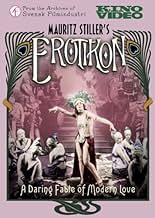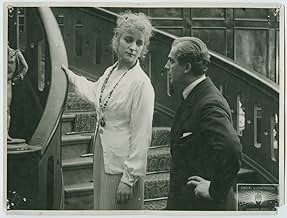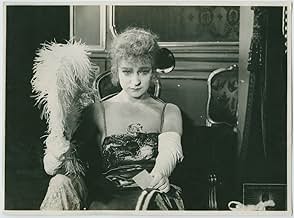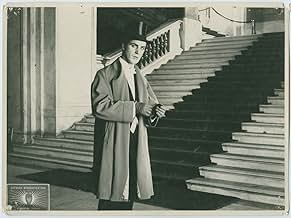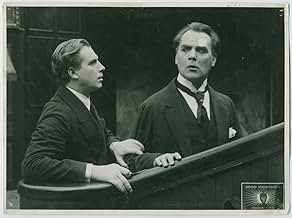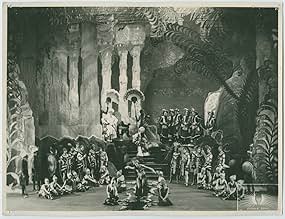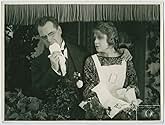PUNTUACIÓN EN IMDb
6,4/10
1,1 mil
TU PUNTUACIÓN
Irene, la esposa aburrida de un entomólogo distraído, persigue a un aviador mujeriego, el mejor amigo de su marido. Mientras tanto, su marido parece volverse inusualmente cercano a su propia... Leer todoIrene, la esposa aburrida de un entomólogo distraído, persigue a un aviador mujeriego, el mejor amigo de su marido. Mientras tanto, su marido parece volverse inusualmente cercano a su propia sobrina.Irene, la esposa aburrida de un entomólogo distraído, persigue a un aviador mujeriego, el mejor amigo de su marido. Mientras tanto, su marido parece volverse inusualmente cercano a su propia sobrina.
- Dirección
- Guión
- Reparto principal
Reseñas destacadas
Insects are very similar to people in their sexual lives, as the entomologist Herr Leo Charpentier ( Anders de Wohl ) knows; some insects, like some people, are bigamists, others monogamists, and the boldest are even polygamists, not to mention the "Ipstypographus" who has three females!
Charpentier's niece Marthe ( Karin Molander ) secretly loves her uncle, and Charpentier's wife Irene ( Tora Teje ) loves Baron Felix ( Vilhem Bryde ), and as well the sculptor Preben Wells, a friend of the whole family ( Lars Hanson ) loves Irene, but that one is an unrequited love... so, that's what "Erotikon", directed by the great Swedish director Herr Mauritz Stiller, is: a film about love and insects.
"Erotikon" is a film that can be divided in two different parts: in its first part it is a high comedy with a remarkable pace and very dynamic editing; the film characters live in villas, go to the city by taxi, fly in airplanes and go to the theater; in this last scene the performance of the ballet "Schaname" is used by Stiller as a metaphor or analogy to explain in a subtle way ( as with the sexual life of insects ) that such complicated relationships have always existed, in ancient Persia ( the ballet tells the story of the Shah's favorite who loves prince Torie, another unrequited love with a tragic ending ) as in modern Sweden ( the entwined relationships of the main characters of the film ). In the last part of "Erotikon" the pace is more slow and static ( focused to solve those complicated love affairs ), the film more romantic, but not forgetting the comedy anyway, emphasizing for this German Count the surprising ending, modern and very advantageous for the film heroes' love interests.
"Erotikon", filmed in 1920, is another great example of the modernity of the silent Swedish cinema ( in editing, acting, and even the audacity to show non-conventional marital relationships ), Herr Mauritz Stiller being one of its more important exponents.
And now, if you'll allow me, I must temporarily take my leave because this German Count must investigate the Ipstypographus' secrets.
Herr Graf Ferdinand Von Galitzien http://ferdinandvongalitzien.blogspot.com/
Charpentier's niece Marthe ( Karin Molander ) secretly loves her uncle, and Charpentier's wife Irene ( Tora Teje ) loves Baron Felix ( Vilhem Bryde ), and as well the sculptor Preben Wells, a friend of the whole family ( Lars Hanson ) loves Irene, but that one is an unrequited love... so, that's what "Erotikon", directed by the great Swedish director Herr Mauritz Stiller, is: a film about love and insects.
"Erotikon" is a film that can be divided in two different parts: in its first part it is a high comedy with a remarkable pace and very dynamic editing; the film characters live in villas, go to the city by taxi, fly in airplanes and go to the theater; in this last scene the performance of the ballet "Schaname" is used by Stiller as a metaphor or analogy to explain in a subtle way ( as with the sexual life of insects ) that such complicated relationships have always existed, in ancient Persia ( the ballet tells the story of the Shah's favorite who loves prince Torie, another unrequited love with a tragic ending ) as in modern Sweden ( the entwined relationships of the main characters of the film ). In the last part of "Erotikon" the pace is more slow and static ( focused to solve those complicated love affairs ), the film more romantic, but not forgetting the comedy anyway, emphasizing for this German Count the surprising ending, modern and very advantageous for the film heroes' love interests.
"Erotikon", filmed in 1920, is another great example of the modernity of the silent Swedish cinema ( in editing, acting, and even the audacity to show non-conventional marital relationships ), Herr Mauritz Stiller being one of its more important exponents.
And now, if you'll allow me, I must temporarily take my leave because this German Count must investigate the Ipstypographus' secrets.
Herr Graf Ferdinand Von Galitzien http://ferdinandvongalitzien.blogspot.com/
Though critically acclaimed, this 1920 film is interesting only from a historical perspective. It was directed notably by the great Swedish director Mauritz Stiller (he was actually a Jew from Finland), who had already directed dozens of films and was a master of his craft. Although he was yet to create his masterpiece The Saga of Gosta Berling, he would only direct a handful of films before his failed residency in Hollywood and premature death in 1928. Also worthy of mention is the film's male lead, a premiere Swedish actor, Lars Hanson, who would famously star several times with Stiller's great discovery Greta Garbo. Erotikon, though, scarcely lives up to its salacious title. It may have been somewhat daring in 1920, but today it is less apt to raise eyebrows than to close eyelids. There must have been a hundred silent features that would deal more compellingly with the theme of the errant wife and the dull husband. While there is no question Stiller has grasped the art of motion picture making -- the acting and camera-work and editing are polished and some of the title cards are witty, artistically the film is a disappointment. Even for one accustomed to the conventions of silent films, it is painfully slow and devoid of arresting incident. Only the unconventional ending (which I won't divulge) somewhat saves it. And the nicely restored Kino version unhappily features a musical score which does little to arise audience interest or connection to the plot. Its atrocious fiddle-scraping may be apt for the contemplation of suicide, but after a half hour or so its annoying discordance becomes unbearable and anyone of auditory sensibilities will soon be reduced to viewing this feature in grateful silence.
10lasse-16
A scientist falls in love with a young girl who brings life and joy into his old house and marriage, while his wife is having an affair with his best friend. This is a completely delightful romantic comedy - one of the first ones ever? - with an abundance of wit and good acting. Mauritz Stiller is sometimes considered less interesting than his contemporary Swedish director Victor Sjöström, but Stiller had a feel for style and comedy which makes his films in my eyes fresher and more enjoyable than Sjöström's films. Stiller's more somber films have not aged as well as his comedies. Erotikon is perhaps a ditty, but it is certainly a wonderful one. If possible, see it in a cinema with a piano player playing live music - the film truly benefits from it.
Huge, dead tree beetles, a long-haired Arabian beauty dancing an erotic, half-naked dance of the veils wearing an exotic peacock-feathered headdress, and a niece who secretly likes to kick up her legs and smoke, makes mutton and cabbage casserole, and flirts with her own uncle - just a few of the things featured in this somewhat weird, but interesting, and even, at times, mildly amusing silent film. The film is about Leo, a professor of entomology and his tired-looking, bored "touched with melancholy" wife Irene, who has a crush on her husband's best friend, a handsome sculptor named Preben (Lars Hanson). Preben is in love with Irene as well, but holds back because of his friendship with her husband. Meanwhile, Leo flirts with, of all things, his own niece (and she must be a blood relative as she has the same last name as him!). Jealousies ensue.
I thought the film was pretty well done and enjoyable, though a bit slow in parts. The music score that accompanies this film didn't really suit the story very well and was pretty heavy and gloomy for most of the film - in fact, it was really getting on my nerves (not in a good way) for the last half hour or so. The music did suit the story in a few places though - namely, a scene where they attend the opera to see this fantasy ballet featuring the on-stage tale of a Shah and his beautiful "favorite wife", and my favorite scene in the film - an interesting bit of photography in which Irene takes a flight with another of her flirtations, Baron Felix, and we watch their little plane as it sours through the air, Irene's scarf flying in the open air cockpit, and camera strapped to the wings as it looks through the moving clouds to the landscape below. Well done. The print of this looked very good, tinted in most scenes a sort of bright yellow-brown shade.
I thought the film was pretty well done and enjoyable, though a bit slow in parts. The music score that accompanies this film didn't really suit the story very well and was pretty heavy and gloomy for most of the film - in fact, it was really getting on my nerves (not in a good way) for the last half hour or so. The music did suit the story in a few places though - namely, a scene where they attend the opera to see this fantasy ballet featuring the on-stage tale of a Shah and his beautiful "favorite wife", and my favorite scene in the film - an interesting bit of photography in which Irene takes a flight with another of her flirtations, Baron Felix, and we watch their little plane as it sours through the air, Irene's scarf flying in the open air cockpit, and camera strapped to the wings as it looks through the moving clouds to the landscape below. Well done. The print of this looked very good, tinted in most scenes a sort of bright yellow-brown shade.
A professor has a bit of an infatuation with his niece; the professor's wife, a cosmopolitan lady of leisure, takes up with a flashy aviator, mainly, it seems, to torment a sculptor who loves her; turn up the heat, stir, and wait for the boil...
The DVD release's jacket does a mild disservice to Mauritz Stiller's Erotikon (1920) by stating that its slyly sardonic approach to sexual intrigue inspired Ernst Lubitsch. As the only Lubitsch film I've seen that predates Erotikon is the preposterous and galumphing Eyes of the Mummy, I'm prepared to accept that Lubitsch had a significant epiphany that helped him become the sort of filmmaker who could make The Marriage Circle. But the expectation is thus set that Erotikon will have an effervescent comic pace and a constantly winking eye like a Lubitsch film of the 30s-- and that is not the case.
A better touchstone for the film is The Rules of the Game (not least because an aviator plays so prominent a role), a movie which observes, with the sad empathy of a veteran priest with many Saturdays spent listening to confession behind him, the desperate efforts of a group of humans to chase after happiness-- only to make things worse in most cases. Erotikon begins with a fussy middle-aged professor lecturing on bigamous beetles (oddly anticipating the recent movie biography of Dr. Kinsey), and takes a consciously scientific detachment toward its characters as they scurry about, trying to keep mortality at bay by finding some form of erotic excitement in lives which are a bit too settled, under-occupied and, it appears, sexually frustrated. A comedy, yes, and even one that wraps up in high spirits, and yet a comedy that's touched throughout by melancholy, and played with a sort of gravity and a deliberate pace that gives us time to feel the hurt under the surface.
Or so it seemed to me when I watched it tonight. Then I watched the "intro" by the film scholar Peter Cowie, and learned that Erotikon is quite the opposite. Unlike Smiles of a Summer Night, another obvious comparison, Erotikon's comedy does not have a moralistic melancholy undertone, says Cowie. What struck me as gravity, like Preston Sturges slowed down to Douglas Sirk if not Carl Dreyer, strikes Cowie as "frothy."
How to account for the fact that Cowie sees a completely different Erotikon than I do? Well, for one thing, I suppose he has far more experience of Scandinavian cinema on which to build his preconceptions; next to a diet of Sjostrom, Bergman, Strindberg and Hamsun, Erotikon IS frothy, I'm sure. And I doubt he had seen it, the first few times at least, with the particular score on this DVD, a Celtic dirge that seems to belong to a production of "The Death of Cuchulain" more than it does to a 1920s drawing room comedy; it certainly puts the film in a dourer key than a conventional romantic comedy score would have. Maybe I'll try watching it again with something peppier, and see if it's a different movie.
Adding to the uncertainty of tone is the fact that the film contains a wide variety of acting styles. Tora Teje (as the socialite wife) and Lars Hanson (as the sculptor) are highly effective in a theatrical, heightened-naturalism sort of way, while Anders de Wahl as the husband and especially Torsten Hammaren as an aged professor who seems to be the Swedish answer to Mr. Muckle in It's a Gift are caricatures of woolly-headed academia. It's a bit like Deborah Kerr in Bonjour Tristesse being married to Fred MacMurray in The Absent-Minded Professor.
Despite this mismatch-- perhaps to be expected in such a trailblazing comedy with no apparent models to follow, other than its stage original-- Erotikon is a striking and interesting film, one of the few silents that seems to leap out of the period, untouched by the customary moralizing Victorian preconceptions of what is proper behavior for its characters (and proper punishment for those who violate it). Erotikon simply observes what these creatures do naturally; applying morals to them would be self-delusion, and Erotikon is a movie largely free of illusions.
The DVD release's jacket does a mild disservice to Mauritz Stiller's Erotikon (1920) by stating that its slyly sardonic approach to sexual intrigue inspired Ernst Lubitsch. As the only Lubitsch film I've seen that predates Erotikon is the preposterous and galumphing Eyes of the Mummy, I'm prepared to accept that Lubitsch had a significant epiphany that helped him become the sort of filmmaker who could make The Marriage Circle. But the expectation is thus set that Erotikon will have an effervescent comic pace and a constantly winking eye like a Lubitsch film of the 30s-- and that is not the case.
A better touchstone for the film is The Rules of the Game (not least because an aviator plays so prominent a role), a movie which observes, with the sad empathy of a veteran priest with many Saturdays spent listening to confession behind him, the desperate efforts of a group of humans to chase after happiness-- only to make things worse in most cases. Erotikon begins with a fussy middle-aged professor lecturing on bigamous beetles (oddly anticipating the recent movie biography of Dr. Kinsey), and takes a consciously scientific detachment toward its characters as they scurry about, trying to keep mortality at bay by finding some form of erotic excitement in lives which are a bit too settled, under-occupied and, it appears, sexually frustrated. A comedy, yes, and even one that wraps up in high spirits, and yet a comedy that's touched throughout by melancholy, and played with a sort of gravity and a deliberate pace that gives us time to feel the hurt under the surface.
Or so it seemed to me when I watched it tonight. Then I watched the "intro" by the film scholar Peter Cowie, and learned that Erotikon is quite the opposite. Unlike Smiles of a Summer Night, another obvious comparison, Erotikon's comedy does not have a moralistic melancholy undertone, says Cowie. What struck me as gravity, like Preston Sturges slowed down to Douglas Sirk if not Carl Dreyer, strikes Cowie as "frothy."
How to account for the fact that Cowie sees a completely different Erotikon than I do? Well, for one thing, I suppose he has far more experience of Scandinavian cinema on which to build his preconceptions; next to a diet of Sjostrom, Bergman, Strindberg and Hamsun, Erotikon IS frothy, I'm sure. And I doubt he had seen it, the first few times at least, with the particular score on this DVD, a Celtic dirge that seems to belong to a production of "The Death of Cuchulain" more than it does to a 1920s drawing room comedy; it certainly puts the film in a dourer key than a conventional romantic comedy score would have. Maybe I'll try watching it again with something peppier, and see if it's a different movie.
Adding to the uncertainty of tone is the fact that the film contains a wide variety of acting styles. Tora Teje (as the socialite wife) and Lars Hanson (as the sculptor) are highly effective in a theatrical, heightened-naturalism sort of way, while Anders de Wahl as the husband and especially Torsten Hammaren as an aged professor who seems to be the Swedish answer to Mr. Muckle in It's a Gift are caricatures of woolly-headed academia. It's a bit like Deborah Kerr in Bonjour Tristesse being married to Fred MacMurray in The Absent-Minded Professor.
Despite this mismatch-- perhaps to be expected in such a trailblazing comedy with no apparent models to follow, other than its stage original-- Erotikon is a striking and interesting film, one of the few silents that seems to leap out of the period, untouched by the customary moralizing Victorian preconceptions of what is proper behavior for its characters (and proper punishment for those who violate it). Erotikon simply observes what these creatures do naturally; applying morals to them would be self-delusion, and Erotikon is a movie largely free of illusions.
¿Sabías que...?
- ConexionesFeatured in Cinema Europe: The Other Hollywood (1995)
Selecciones populares
Inicia sesión para calificar y añadir a tu lista para recibir recomendaciones personalizadas
- How long is Erotikon?Con tecnología de Alexa
Detalles
- Duración1 hora 46 minutos
- Color
- Mezcla de sonido
- Relación de aspecto
- 1.33 : 1
Contribuir a esta página
Sugerir un cambio o añadir el contenido que falta

Principal laguna de datos
What is the English language plot outline for Cuando ellas quieren (1920)?
Responde
